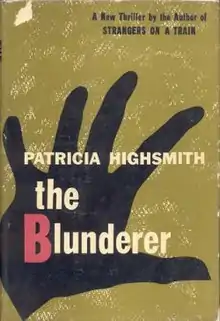The Blunderer
The Blunderer is a psychological thriller by Patricia Highsmith, first published in 1954 by Coward-McCann. It was third of her 22 novels, the second published under her own name.
 First edition (US) | |
| Author | Patricia Highsmith |
|---|---|
| Country | United States |
| Language | English |
| Genre | Psychological thriller, mystery |
| Publisher | Coward-McCann (US, 1954); W. W. Norton & Company (US, 2001) |
Publication date | 1954 |
| Media type | Print (hardback & paperback) |
| Pages | 288 pp |
| ISBN | 978-0-393-32244-6 |
| OCLC | 48053872 |
| 813/.54 21 | |
| LC Class | PS3558.I366 B58 2001 |
Synopsis
Mild-mannered lawyer Walter Stackhouse hates his neurotic wife, Clara. He has suffered for years as she alienated all his friends and embarrassed him with her pettiness, overly dramatic gestures and intolerance of other people's needs. With Walter, she is increasingly distant and, without foundation, begins to accuse him of having an affair with the sweet and sensuous music teacher Ellie Briess. Walter does eventually become infatuated with Ellie and starts a relationship with her. Jealous Clara then attempts suicide by overdose, forcing Walter back into her arms. However, immediately upon recovering from near-death, Clara falls into her usual pattern; Walter finally stands his ground and demands a divorce.
Clara is then found dead, having fallen off a cliff during a rest interval while taking a bus to see her dying mother. It is likely suicide. In time, as the official investigation continues, Walter has to admit to a couple of questionable activities–stalking Clara's bus in his car, while daydreaming about possibly killing her at the first stop and visiting Melchior Kimmel, a bookshop manager who got away with killing his own wife, prior to Clara's death. Both Walter and Kimmel soon encounter the formidable, possibly psychotic Lieutenant Lawrence Corby, a police officer with savage ambition who is convinced they are both guilty. Corby soon begins encroaching on his suspects' lives, releasing details of their behavior to the press in an effort to distance them from their friends and work associates and repeatedly assaulting Kimmel.
Throughout, Walter's blundering damages his relationships, his reputation and soon threatens his life.
Reception
In The New York Times, Anthony Boucher recognized the novel's similarity to Strangers on a Train in its "striking plot idea", which is "so complex that it defies brief synopsis". He continued:[1]
The novel starts off admirably both as suspense and as a deeper analysis of character, but passes the point of no return as the author gropes for (and fails to find) a way out of the intricate situation she has set up. Hardly a successful novel, but an ambitious and largely interesting attempt.
Film adaptations
- Enough Rope (1963, French-language title: Le Meurtrier), a French film directed by Claude Autant-Lara[2]
- A Kind of Murder (2016), directed by Andy Goddard and starring Patrick Wilson and Jessica Biel[3]
References
- Boucher, Anthony (October 3, 1954). "Criminals at Large" (PDF). New York Times. Retrieved December 11, 2015.
- Enough Rope at IMDb
- Abramovitch, Seth (September 25, 2015). "Killer Films' Co-Founders Christine Vachon and Pamela Koffler on Lesbian Romance 'Carol' and Indie Resilience". Hollywood Reporter. Retrieved December 2, 2015.
External links
- The Blunderer (book details) - ChooseYourHighsmith.com